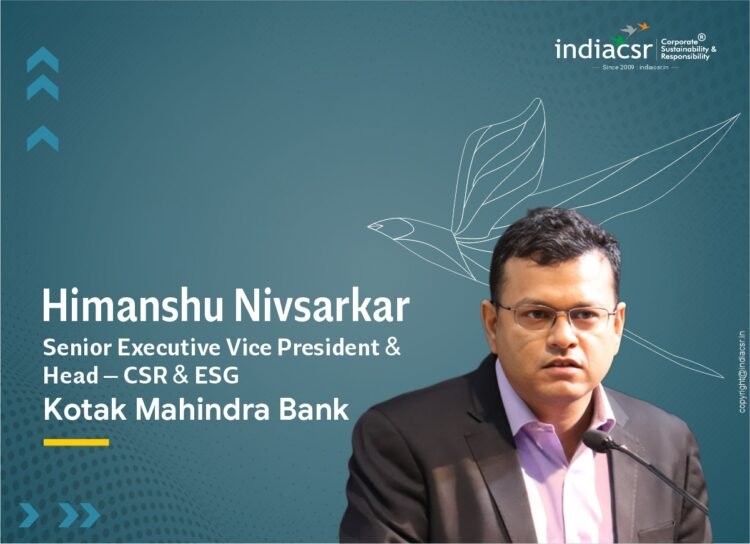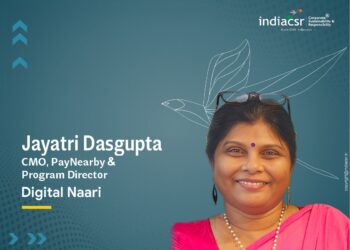
By Rusen Kumar
NEW DELHI (India CSR): Himanshu Nivsarkar, Senior Executive Vice President and Head of CSR & ESG at Kotak Mahindra Bank, leads the bank’s efforts to integrate sustainability and responsible business practices into its operations. With a clear focus on aligning its strategies with global Sustainable Development Goals (SDGs), Kotak has embarked on numerous impactful initiatives in areas such as education, healthcare, community development, and environmental sustainability. Through its strategic investments in projects like the Kotak IISc AI-ML Centre, the Kotak School of Sustainability, and various healthcare and sports initiatives, Kotak Mahindra Bank is driving a vision of long-term, systemic change. In this insightful conversation, Himanshu Nivsarkar shares Kotak’s approach to CSR, the key drivers behind its ESG strategies, and the impact of the bank’s sustainability initiatives. From advancing AI research in India to promoting climate action and community development, Kotak’s commitment to fostering sustainable growth continues to create meaningful impact across the country.
1. Kotak Mahindra Bank’s ESG Vision and Strategy
Kotak Mahindra Bank has been actively driving large-scale impact across various sectors. Could you share the bank’s overarching ESG vision and how it aligns with the broader sustainable development goals (SDGs)? What are the key drivers shaping your CSR and ESG strategy?
It is the Kotak’s constant endeavor to contribute towards sustainable development and growth by adopting responsible business practices which serve the interest of all its stakeholders, including the environment and society at large.
Kotak’s ESG framework integrates sustainability into its core business strategies and operations.
It aims to improve the quality of life of the communities by creating a positive impact through its CSR initiatives in education, livelihoods, healthcare and environment. The most important drivers behind our CSR and ESG strategies are focus on community empowerment, innovation, strategic partnerships and long-term impact. Partnerships with educational institutions, government agencies and other interest groups strengthen our reach and effectiveness, ensuring that our initiatives lead to systematic and sustainable change in society.
2. Kotak IISc AI-ML Centre: Advancing AI Research in India
The Kotak IISc AI-ML Centre is a significant initiative aimed at positioning India as a global leader in AI-ML research. What specific areas of AI-ML research does the center focus on, and how do you envision its long-term contribution to India’s technological and economic landscape?
The Kotak IISc AI-ML Centre (KIAC) is a state-of-the-art AI-ML at IISc Bangalore. The centre was established with the goal of developing rigorously trained experts who will become future leaders of this technology and champion India’s surge in this area, conduct cutting edge research in this area leading to international visibility of the highest order, and develop innovative, deep-tech solutions to meet the current and emerging requirements of the industry. The Centre will house modern facilities such as laboratories, computational resources, faculty offices, interaction spaces, smart lecture halls, multimedia auditorium, and audio-visual studio to support collaborative research, education, and innovation in AI and ML.
The research efforts of the KIAC are currently focused around: (i) AI in Health, (ii) AI and ML for FinTech, and (iii) Multimodal Generative AI for Vision.
KIAC is a key driver of Health AI innovation at the Indian Institute of Science (IISc) and works on areas such as for eyecare, large-scale screening of oral cancer, diagnostics and disease identification. The integration of artificial intelligence and machine learning in the financial technology (FinTech) sector has already begun transforming key aspects of the industry. KIAC will explore the themes of transaction networks, quantitative models for FinTech & Crypto and FinTech where AI, ML, and advanced quantitative models intersect to drive innovation and improve operational efficiencies in FinTech. The multimodal generative AI for vision vertical aims to develop advanced multimodal generative AI techniques to enhance vision-based applications that allow humans to understand and interact with the environment around them. It focusses on 3D-aware text-to-video generation, 3D representations and rendering for novel view synthesis & image/video editing and responsible generation.
ALSO READ | Empowering Rural Craft Entrepreneurs: An Interview with N E Sridhar, Titan Company
3. The Kotak School of Sustainability: Climate Action and Research
With a ₹120 crore investment, the Kotak School of Sustainability (KSS) at IIT Kanpur reflects a deep commitment to climate and sustainability research. What key research areas will this initiative focus on, and how does Kotak plan to translate these research outcomes into actionable climate solutions?
The Kotak School of Sustainability at IIT Kanpur, is an interdisciplinary school that intends to integrate engineering, science, and humanities to address multiple sustainability related issues. KSS will have its own academic function and will bring in courses specific in area of Sustainability. The first Master’s programme under the school in AI for Sustainability is getting launched in upcoming academic session in Sep 2025. The school aims to become a hub for India-specific sustainability solutions, directly contributing to climate action and policy creation.
Currently around 15 impactful research projects are being supported by the school in diverse areas like weather, climate & floods, environment, public health & sanitation, green-tech & sustainable production etc. Furthermore, AIRAWAT (Artificial Intelligence for Robust Analysis, Warnings & Treatments) – a centre of excellence and part of the Kotak School of Sustainability, has been set up to leverage AI to address challenges related to sustainable cities like energy forecasting, air quality, urban flood management and developing digital twins for transportation and city management along with startups, industries and tech companies.
Kotak is supporting research work at KSS with aim that the output be expanded for practical uses, encouraging sustainable business practices in a variety of industries. In addition, by training people in sustainability, KSS shall steer India’s economy towards a greener, more resilient future, aligning with national and global sustainability goals and indirectly supporting Kotak’s larger ESG commitments.
4. Community Development Through Sports and Healthcare
From the Kotak Pullela Gopichand Badminton Academy to extensive healthcare interventions across 16 states, Kotak has played a pivotal role in community development. Could you share insights on how these programs are creating a measurable impact, and what future expansions are planned in these areas?
The Kotak Pullela Gopichand Badminton Academy at Gachibowli (Hyderabad) was set up with CSR support from Kotak. The academy has world-class training facilities that is supporting development of athletes bringing out players who participate in international tournaments and bring laurels to the nation. The academy has six air-conditioned courts, gym, swimming pool and a sports science centre for holistic athlete development. Kotak is also supporting training of select athletes at the Academy thus providing opportunities for young athletes to excel and represent the country on global platforms.
Kotak also has partnership with IIS to support the training and development of boxers in Vijayanagar, Karnataka.
Kotak’s CSR initiatives in Healthcare are towards enhancing access to healthcare, preventive healthcare, and support building critical infrastructure at various institutions. Kotak has supported critical infrastructure and access for cancer patients across multiple cities (Mumbai, Vellore, Raigad, Vrindavan, Varanasi etc) in India. Kotak intends to expand these efforts in the future to other cities. Kotak’s healthcare initiative span across 13 states, 22 districts, have greatly increased the health access for rural areas through mobile medical units and health camps, directly improving health outcomes by delivering preventive and curative care which have helped to bridge the gap in these areas.
5. Sustainability Initiatives and Corporate Responsibility
Kotak has undertaken multiple sustainability initiatives, such as lake rejuvenation, afforestation, and energy efficiency for MSMEs. How do these programs integrate with the bank’s broader environmental goals, and what challenges do you foresee in scaling these sustainability efforts further?
Kotak’s direct energy and water footprint is largely limited to the physical network. The multiple environment-focused initiatives under CSR work across multiple locations and go beyond Kotak’s own consumption. Activities such as lake rejuvenation, afforestation, and the Kotak IIT Madras Save Energy Mission, contribute to the overall goal of building a sustainable future. These initiatives aim to reduce the carbon footprint, address water scarcity, support biodiversity, and increase energy efficiency in line with the Sustainable Development Goals of the United Nations. Through these initiatives, Kotak is negating its impact on the environment.
Scaling of these sustainability efforts requires consistent financing support, post implementation monitoring and ownership of government machinery and local citizens. Most of Kotak’s work plays a catalyzing role to evoke a larger change. For example, the restored waterbodies and green spaces provides access of space where citizens can interact with nature and hopefully be sensitized to conserve and protect it. The energy audits and energy efficiency recommendations aids the first step for MSME’s which may generate ideas and concrete plans for their decarbonization. Increased co-operation with Government, citizens, businesses and the policy landscape can expand the programs.
ALSO READ | Empowering Women Drivers: An Interview with Balamurugan Thevar, CSR Head at Shriram Finance
As a participant in the nation’s banking system, Kotak contributes and impacts environment through its lending and investments. Thus. Kotak’s larger emission footprint is driven by economic activity and investments into infrastructure, industry etc. in India. Any meaningful progress on this including Net Zero is thus largely driven by government policies and nation’s priorities. Kotak as responsible bank is aligned with the nation’s targets and adheres to government policies and regulator (like RBI/SEBI) directives.
***
About Rusen Kumar
Rusen Kumar is a distinguished journalist, author, and visionary knowledge entrepreneur specializing in Corporate Social Responsibility (CSR) and sustainability in India. He is the founder and managing editor of India CSR Network, a leading platform dedicated to CSR and sustainability issues.
Copyright@IndiaCSR




















